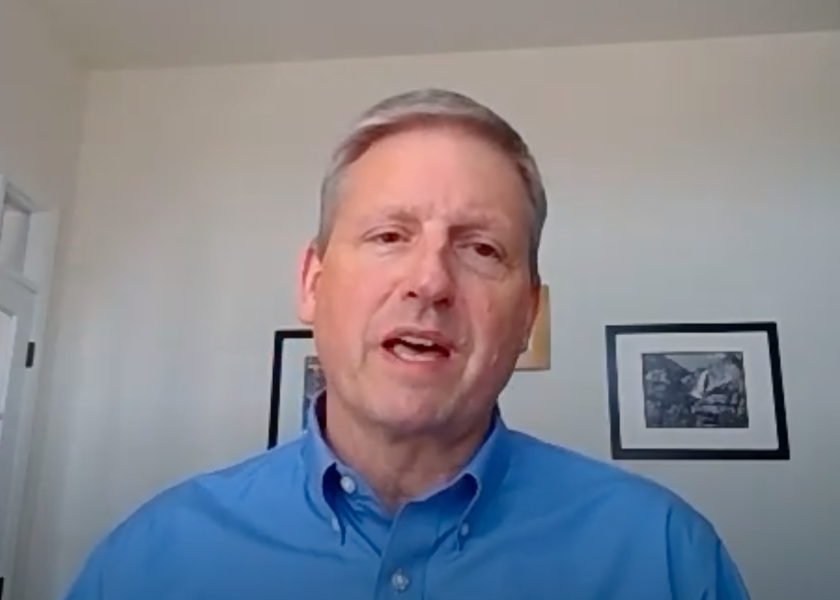Greg Hanes: Beef Checkoff: Who’s Who & How It Works

Beef. It seems like the kind of commodity that would be simple, straightforward, easy to understand. Except…it’s not. The industry’s long history of organizational splits, reinventions, mergers and aliases — along with the fact that many association names sound similar — is enough to make anybody’s head spin. Even folks from other commodities agree that the beef world is complex, and so is its Checkoff.
For three and a half decades, the Beef Checkoff has existed to promote beef, but unless you are actively engaged in the program, you may not fully understand its management and oversight. Those duties are clearly assigned to the Cattlemen’s Beef Promotion & Research Board (aka, Cattlemen’s Beef Board/CBB) by the Beef Promotion and Research Act. Even with completely separate boards, staffs and offices, two common misperceptions remain: the belief that the National Cattlemen’s Beef Association (NCBA) oversees the Checkoff — and that CBB and NCBA are one and the same. Nothing could be further from the truth.
BACKGROUND
The 1985 Farm Bill created the CBB to administer the Beef Checkoff program. Through the dollar-a-head assessment on the sale of all cattle and equivalent amount on imported beef and beef products, each year the CBB funds promotion, research and education proposals presented to the Beef Promotion Operating Committee (BPOC) by established, national, non-profit beef or cattle industry-governed organizations. Once a proposal is approved by the BPOC, the organization becomes a Checkoff “contractor” and conducts the work according to guidelines and program evaluations that ensure proposal objectives are met.
ANSWERING THE BIG QUESTION
By law, absolutely no Checkoff funds can be used for policy or lobbying efforts. That said, the Beef Checkoff’s largest contractor, NCBA, does have a policy division. So, how does that work? Through closely monitored processes and a “firewall” that keeps policy work and Checkoff-funded work separate.
As a trade association representing U.S. cattle producers, NCBA is like a coin with two sides. One side, the Policy Division, works to advance the political interests of its members. Any discussion of NCBA and policy is valid, but that’s NCBA’s Policy Division at play and has nothing to do with the CBB or Checkoff.
The other side of NCBA is qualified to contract with the BPOC to conduct Checkoff promotion, research and education work as an established, national, non-profit beef or cattle industry governed organization. To be clear, it is not the organization’s policy side that competes in this arena.
Just like any other Checkoff contractor, NCBA must adhere to all rules and processes, and its contract work is managed by the CBB. Each year, it must submit Authorization Requests (program proposals) that fully outline the project work it wants to do. It must file progress reports, quarterly oversight evaluations and regular reviews. It can only receive Checkoff dollars on a cost-recovery basis, which means it pays expenses up front and is only reimbursed after the CBB reviews invoices and documentation proving the money was spent appropriately and within the parameters of the Authorization Request. A dedicated compliance officer ensures all provisions of the Act and the Order are followed, that the “firewall” is maintained and that no Checkoff funds are used for policy or lobbying.
For the current fiscal year, the Beef Checkoff has nine contractors:
• American Farm Bureau Foundation for Agriculture (AFBFA)*
• Cattlemen’s Beef Board, which manages the Producer Communications program
• Foundation for Meat & Poultry Research and Education (FMPRE)
• Meat Importers Council of America (MICA)
• National Cattlemen’s Beef Association (NCBA)*
• National Institute for Animal Agriculture (NIAA)
• North American Meat Institute (NAMI)*
• U.S. Cattlemen’s Association (USCA)*
• U.S. Meat Export Federation (USMEF)
So, in a nutshell, the CBB oversees operation of the Beef Checkoff and its contractors, including NCBA. The “beef world” is definitely not uncomplicated, but each organization that does Beef Checkoff-funded work on behalf of producers has a unique area of expertise. In the end, it all contributes to a great big, coordinated effort to drive demand for beef.
*Denotes organization with separate policy division; however, no Beef Checkoff funds support policy or lobbying efforts.
ABOUT THE BEEF CHECKOFF:
The Beef Checkoff Program was established as part of the 1985 Farm Bill. The Checkoff assesses $1 per head on the sale of live domestic and imported cattle, in addition to a comparable assessment on imported beef and beef products. States may retain up to 50 cents on the dollar and forward the other 50 cents per head to the Cattlemen’s Beef Promotion and Research Board, which administers the national Checkoff program, subject to USDA approval.







